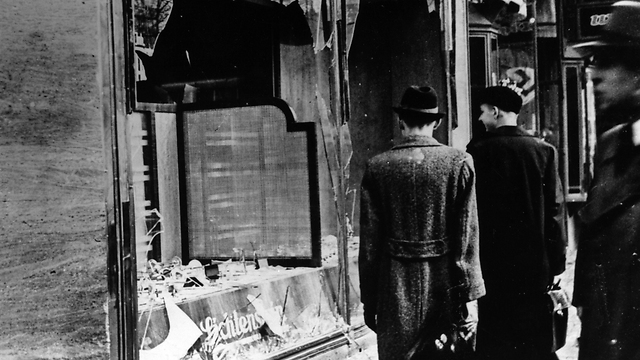
Kristallnacht remembered, memory fades
Infamous pogrom against Jews which took place 75 years ago marked with ceremonies in Berlin, Vienna, elsewhere over weekend. Focus of remembrance switches from bringing perpetrators to justice to educating generation growing up as survivors die out
It was the day after Kristallnacht, a state-sponsored spree of looting and destruction of Jewish property across Germany and Austria that marked a turning point in Nazi policy as Adolf Hitler unleashed the general population against the Jews.
Video courtesy of jn1.tv
"The two Nazis looked us over and after a while – this was November 10th, it was cold out - they told my father to get his hat and coat and said: 'You're coming with us,'" Drukker told Reuters on a visit to Vienna from her home in Philadelphia.
"We saw from the window how they got out of the building and pushed my father into the back seat of the car that was parked in front and drove away," she said. "We didn't know where they took him or what was happening. There were rumors."
Scores of Jews were killed in the Kristallnacht (Night of Broken Glass), and thousands of Jewish businesses and synagogues were ransacked as law-enforcement organs looked on, signaling the start of the Holocaust.
The 75th anniversary of the infamous pogrom is being marked with ceremonies in Berlin, Vienna and elsewhere this weekend.

Night of the Broken Glass, 1938 (Photo: Getty Images)
Events such as the coming to light last weekend of a huge hidden trove of Nazi-looted art show that many questions and claims for restitution arising from the Holocaust and World War II remain unresolved.
But the nature of remembrance is changing as governments absorb the work once done by activists, and the focus switches from bringing the perpetrators to justice to educating a generation growing up as the events fade from living memory.
"Time goes by, it's clear. It's not like it was a few years ago. You have to consider that the survivors are dying out," said Beate Klarsfeld, a driving force in hunting down and bringing to justice war criminals including Klaus Barbie.
Klarsfeld, 78, now spends much of her time on educational work, and was invited to Vienna to speak at the opening of a Holocaust exhibition aimed at school classes.
Ambivalence towards remembrance
The opening was presided over by a government minister and attended by dignitaries including the head of Austria's Jewish community. But the exhibit itself was buried in the cellar of a Jewish theater in the Leopoldstadt district outside the city center.
"I think it's important, but it's a shame it's in the basement," said Ari Rath, who fled Vienna as a boy in 1938 and spent many years as editor of the Jerusalem Post in Israel before becoming an Austrian citizen again in 2007.
The situation underlines the ambivalent attitudes to remembrance of Nazi atrocities, especially in Austria, which largely welcomed Hitler's annexation in 1938 but spent decades after the war considering itself the dictator's first victim.
While governments carry out their tasks of remembrance in a dutiful and sometimes heartfelt way, Jewish groups warn against complacency among the general population, citing resurgent anti-Semitism in Europe and newer concerns about Islamophobia.

Kristallnacht marked in Jewish school in Berlin (Photo: Getty Images)

Israel's Chief Rabbi David Lau in Berlin (Photo: Getty Images)
In a report published on Friday by the European Union Agency for Fundamental Rights, over half of 5,847 Jews surveyed in eight EU countries said they had heard or seen someone claim that the Holocaust was a myth or had been exaggerated.
New York Rabbi Marc Schneier, himself the descendant of Viennese Jews, has spent years working to build bridges with the Muslim community and he urged solidarity with other minorities during a visit to Vienna this week.
"Had there been these alliances 75 years ago, it would have been a very, very different story," he told Reuters ahead of a Kristallnacht remembrance event at the Austrian parliament. "It's about fighting for the other."
Drukker's father, Josef Geringer, a violinist with the Vienna Philharmonic until he was pushed out in early 1938, was released from Dachau thanks to the intervention of an influential non-Jewish friend from the orchestra.
Drukker escaped to London on a British children's transport and eventually joined her parents in the United States.










